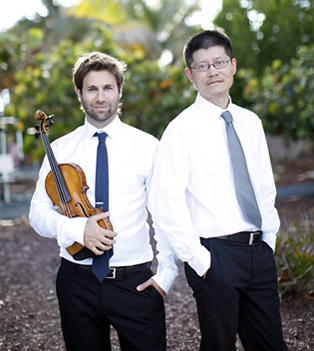This preview has been provided by the Raleigh Chamber Music Guild.
Elegant. Enduring. Voluptuous.
These terms – and many others – have long been used to describe what Franz Schubert accomplished in his vast and brilliant catalogue of chamber music. Since 2011, one more item can be added to his list of credits: that of collaborative matchmaker.
“It was Schubert who brought us together,” says pianist Tao Lin in recalling the genesis of his work with violinist Tomas Cotik. “Tomas really wanted to record the Schubert Fantasy in C Major,” Lin says. The 24-minute work has since become something of a signature offering for the two. “It’s a hard piece,” Lin says, “but one of the greatest masterworks for violin and piano.”
The Cotik/Lin duo will perform the stately Schubert work as part of its March 1st concert at Raleigh’s Fletcher Opera Theater. The Raleigh Chamber Music Guild (RCMG) is presenting Cotik and Lin as part of its Masters Series.
Since launching their duo, Cotik and Lin have recorded a two-volume series of Schubert’s complete works for violin and piano on the Centaur Records label. “Through the Schubert project, we realized we got along very well both musically and personally,” says Tomas Cotik. While both artists count Schubert among their favorite composers, his Fantasy in C Major occupies an even more pivotal place in the heart and mind of Cotik, who analyzed the work as part of his 2013 doctoral dissertation at the University of Miami.
“It’s a rather long but really majestic piece,” Cotik says. His analytical deep-dive into the intricacies of the Schubert Fantasy yielded an understanding so rich that it makes the duo’s interpretation uniquely their own. “We hope our performance of it is more authentic and historically accurate,” says Cotik.
The duo and its repertoire are nothing if not global. Cotik was reared in Argentina before leaving for Germany to pursue bachelors and masters degrees at the Freiburg University of Music. Lin is a native of Shanghai, and returns annually to China to teach and perform. He was admitted to the Shanghai Conservatory of Music at the tender age of eight. Today, both musicians call Miami home.
The duo’s Raleigh performance also includes Astor Piazzolla’s “Histoire du Tango,” composed in 1986 for flute and guitar. The four-movement piece depicts the origin and evolution of the tango from 1900 through “today.” Two local dancers will join the musicians on stage in adding a visual dimension to the music.
“Piazzolla creates pictures of the tango’s history in 30-year increments,” Cotik explains. It is another instance where Cotik explored a composer and his music from an academic perspective. “I wrote my masters thesis about Piazzolla while I was in Germany,” he says. In fact, the music of his fellow Argentine failed to resonate much with Cotik in his youth. “When I was growing up in Buenos Aires, tango music wasn’t something young people considered very cool,” he recalls. “I became a lot more interested in Piazzolla while I was in Germany.”
The March 1st program will also include the work of a quintessential U.S. composer: George Gershwin. Published in 1926, the “Three Preludes” are short, jazz-inspired pieces initially composed for solo piano. Jascha Heifetz, the violin legend and close Gershwin friend, arranged the now-familiar work for violin and piano in 1942.
“Gershwin is about as close as you can get to jazz and still be in the classical genre,” Lin says. The composer and his music have achieved popularity in China, he notes. “Jazz has become very popular in China,” Lin says. “And Chinese music students really love Gershwin.”
The duo’s Raleigh concert will also feature Giuseppe Tartini’s “Variations on a Theme by Corelli,” a bright Baroque orchestral piece arranged for violin and piano by Fritz Kreisler, as well as Mozart’s Sonata in G major, Op. II, KV 379. With their Schubert project complete, Cotik and Lin are now turning their recording focus to the violin and piano music of Mozart. “We’re in the process of recording Mozart’s complete sonatas,” Cotik says. In the case of the KV 379, it took Mozart just an hour to compose the 22-minute piece.
Given the fast-changing nature of the marketplace for CDs and digital downloads, making records is today more about posterity than profit. “Recording is an artistic medium more than a business,” Cotik explains. “It leaves a legacy of how we see these composers and hear their music, and about how we express ourselves.” The two embrace recorded music because it enables them to share their interpretations with far more listeners than live performances alone would allow. “It means a lot to us that we can reach people who cannot attend one of our concerts,” says Cotik.
In addition to their touring and recording, Cotik and Lin maintain busy teaching schedules. Cotik is an adjunct faculty member at the University of Miami, while Lin serves as an artist faculty member at the Bowdoin International Music Festival in Maine, as well as a visiting professor at Shanghai Normal University Music College.
While in Raleigh, the two will conduct a master class for advanced piano and violin students at Ruggero Piano. The RCMG-sponsored class is from 3:00 to 5:00 p.m. on Saturday, February 28th. The public is welcome to observe the class at no charge.
Both teaching and learning are part of a lifelong musical development process, according to Lin. “When you teach you also are learning a lot about the music,” he says. “I, too, am studying.”
Students and youth ensembles participating in the master class will perform a free showcase recital in the lobby of the Duke Energy Center for the Performing Arts beginning at 2:15 p.m. on March 1st, prior to Cotik and Lin’s 3:00 concert.
Advanced ticketing for Cotik and Lin is available at http://www.brownpapertickets.com/event/759059. Tickets also may be purchased in person on the day of the concert. For additional information, visit www.rcmg.org.
Submitted by Lawrence Bivins,
Vice President of the Raleigh Chamber Music Guild












